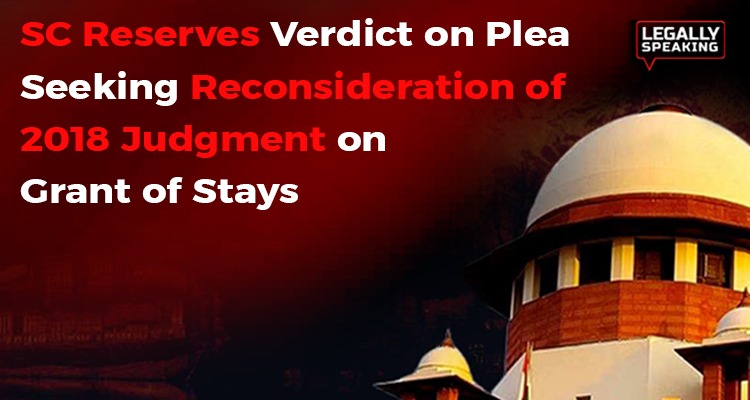
The Supreme Court on Wednesday reserved its verdict on a plea seeking reconsideration of its 2018 judgment, which held that stays granted by lower or high courts in civil and criminal cases would automatically expire after six months unless specifically extended.
A bench of Chief Justice D Y Chandrachud along with Justices A S Oka, JB Pardiwala, Pankaj Mithal, and Manoj Misra heard arguments from senior advocate Rakesh Dwivedi representing the High Court Bar Association of Allahabad, Solicitor General Tushar Mehta, and other legal representatives before reserving the judgment.
Senior advocate Dwivedi contended that the automatic vacation of stays could potentially impinge upon the authority of high courts under Article 226 of the Constitution and might be perceived as a form of judicial legislation. He emphasized the need to uphold the autonomy of high courts. Article 226 of the Constitution confers broad powers upon high courts, enabling them to issue writs and orders for the enforcement of fundamental rights and other purposes.
The Solicitor General concurred with Dwivedi, asserting that the judicial discretion of high courts cannot be restricted by a “judicial mandamus or a continuing mandamus.” On December 1 of this year, the Supreme Court referred the reconsideration of its 2018 judgment to a five-judge bench.
The 2018 judgment stipulated that stays granted by lower or high courts in civil and criminal cases would automatically lapse after six months unless expressly extended.
The constitution bench sought the assistance of either the Attorney General or the Solicitor General to address the legal issues stemming from the earlier judgment. In the 2018 case of Asian Resurfacing of Road Agency P Ltd Director Vs CBI, a three-judge bench held that interim stay orders granted by courts, including high courts, would automatically stand vacated unless specifically extended, leading to no trial or proceedings remaining stayed after six months.
The Top Court later clarified that the judgment would not apply if the stay order was issued by the Supreme Court itself. The Chief Justice-led bench expressed agreement with Dwivedi’s submissions, indicating that the petition would be referred to a five-judge bench since the impugned judgment was rendered by a three-judge bench of the Supreme Court.
Reflecting on the 2018 judgment, the bench raised reservations regarding the correctness of the broad formulation of the principles, stating that the automatic vacation of stays could result in a miscarriage of justice.




